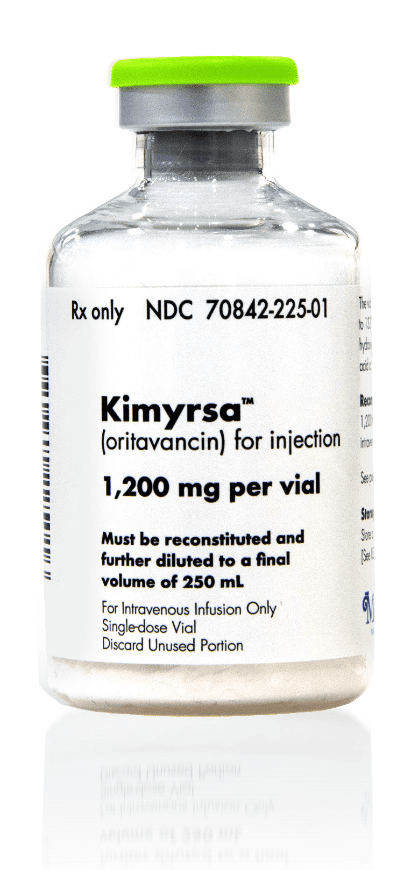Oritavancin Dosage
Medically reviewed by Drugs.com. Last updated on Jun 5, 2025.
Applies to the following strengths: 400 mg; 1200 mg
Usual Adult Dose for:
Additional dosage information:
Usual Adult Dose for Skin and Structure Infection
1200 mg administered as a single dose via IV infusion over 1 hour (Kimyrsa) or 3 hours (Orbactiv)
Comment:
- This drug is available as 2 different products that have different strengths (400 and 1200 mg), duration of infusion (1 or 3 hours), and preparation instructions. The manufacturer product information should be consulted.
- This drug should be given as a single dose.
- To reduce the development of drug-resistant bacteria and maintain the effectiveness of this antibacterial drug and others, use this drug only to treat or prevent infections that are proven or strongly suspected to be caused by bacteria.
Use: For the treatment of acute bacterial skin and skin structure infections due to susceptible isolates of Staphylococcus aureus (including methicillin-susceptible and methicillin-resistant isolates), Streptococcus pyogenes, S agalactiae, S dysgalactiae, S anginosus group (includes S anginosus, S intermedius, and S constellatus), and Enterococcus faecalis (vancomycin-susceptible isolates only)
Renal Dose Adjustments
Mild or moderate renal dysfunction (CrCl 30 to 79 mL/min): No adjustment recommended.
Severe renal dysfunction (CrCl less than 30 mL/min): Data not available
Liver Dose Adjustments
Mild or moderate liver dysfunction (Child-Pugh A or B): No adjustment recommended.
Severe liver dysfunction (Child-Pugh C): Data not available
Precautions
CONTRAINDICATIONS:
- Hypersensitivity to the active component or any of the ingredients
- Use of IV unfractionated heparin sodium for 120 hours (5 days) after administration
Safety and efficacy have not been established in patients younger than 18 years.
Consult WARNINGS section for additional precautions.
Dialysis
This drug is not removed by hemodialysis.
Other Comments
Administration advice:
- This drug is available as 2 different products that have different strengths (400 and 1200 mg), duration of infusion (1 or 3 hours), and preparation instructions. The manufacturer product information should be consulted.
- Administer via IV infusion over 1 hour (Kimyrsa) or 3 hours (Orbactiv); reconstitute and dilute prior to infusion.
- Slow the rate or interrupt infusion if infusion reaction occurs.
- If same IV line is used for sequential infusion of additional drugs, the line should be properly flushed before and after infusion of this drug. The manufacturer product information should be consulted.
Storage requirements:
- Vials of lyophilized powder (both products): Should store at 20C to 25C (68F to 77F); excursions to 15C to 30C (59F to 86F) permitted.
- Diluted IV solution in infusion bag: Should use within 6 hours when stored at room temperature or within 12 hours when refrigerated at 2C to 8C (36F to 46F)
- Combined storage time (reconstituted solution in vial and diluted solution in bag) and infusion time (3 hours) should not exceed 6 hours at room temperature or 12 hours if refrigerated.
- Diluted IV solution in an infusion bag: Should be used within 4 hours when stored at room temperature, or used within 12 hours when refrigerated at 2C to 8C (36F to 46F). The combined storage time (reconstituted solution in the vial and diluted solution in the bag) and 1 hour infusion time should not exceed 4 hours at room temperature or 12 hours if refrigerated.
Reconstitution/preparation techniques: This drug is available as two different products that have differences in dose strengths, duration of infusion, reconstitution and dilution instructions, and compatible diluents. Carefully follow the reconstitution, and dilution instructions with the appropriate compatible diluent for each. The manufacturer product information for each specific product should be consulted.
IV compatibility:
- The manufacturer product information for each specific product should be consulted.
General:
- Limitations of use : There is limited experience in patients with bacteremia, peripheral vascular disease, neutropenia, those who are immunocompromised, and over 65 years old.
Monitoring:
- Gastrointestinal: For signs or symptoms of Clostridioides difficile infection (watery/bloody stools, stomach cramps)
- Hematologic: For signs of bleeding in patients on chronic warfarin
- Hypersensitivity: For signs of hypersensitivity during infusion, especially in patients with glycopeptide allergy
- Infections/Infestations: For signs/symptoms of osteomyelitis
Patient advice:
- Patients should be told to immediately report any signs/symptoms of a hypersensitivity reaction.
- Patients should be instructed to report signs/symptoms of C difficile (e.g., watery/bloody stools, stomach cramps, fever), for up to 2 months after stopping treatment.
More about oritavancin
- Check interactions
- Compare alternatives
- Reviews (2)
- Side effects
- During pregnancy
- Drug class: glycopeptide antibiotics
- Breastfeeding
- En español
Patient resources
Other brands
Professional resources
Other brands
Related treatment guides
See also:
Further information
Always consult your healthcare provider to ensure the information displayed on this page applies to your personal circumstances.


